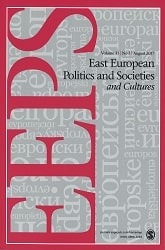Democracy in Central and Eastern Europe One Hundred Years On
Democracy in Central and Eastern Europe One Hundred Years On
Author(s): Grzegorz Ekiert, Daniel ZiblattSubject(s): Political history, Recent History (1900 till today), Government/Political systems, History of Communism, Post-Communist Transformation
Published by: SAGE Publications Ltd
Keywords: democracy; long-run continuities; institutional change; postcommunism;
Summary/Abstract: In the twenty years since communism’s collapse, scholars of postcommmunist Central and Eastern Europe have increasingly converged on the insight that long-run continuities reaching back to the nineteenth century are crucial in shaping some of the most important contemporary macro- and micro-level political outcomes in the region. Today’s political cleavages, political discourses, patterns of partisan affiliation, institutional choice, and the quality of democracy itself all appear to correlate to a remarkable degree with patterns from the “deep past.” To date, social scientists, however, have not sufficiently reflected on what might explain this finding and how to study the impact of the general phenomenon of the long-run in the region. This article makes two contributions. First, we contend that in general, long-run continuities may ironically be more important in contexts of discontinuous institutional change such as in Central and Eastern Europe since frequent institutional disjunctures paradoxically open chasms between formal and informal institutions, preventing gradual change and producing patterns of institutional mimicry to cope with institutional ruptures. This insight may travel to other contexts of weak institutionalization. Second, we reject efforts to identify “deep causes” of contemporary outcomes without specifying how intervening events and crises intersect with these longer-run patterns. The article resuscitates Fernand Braudel’s notion of the longue duree to propose a new cumulative approach to the study of the long-run that complicates accounts that too starkly juxtapose precommunist and communist-era “legacies” on the present and argues that scholars should study how these periods reinforce each other and jointly determine contemporary outcomes.
Journal: East European Politics and Societies
- Issue Year: 27/2013
- Issue No: 01
- Page Range: 90-107
- Page Count: 18
- Language: English
- Content File-PDF

